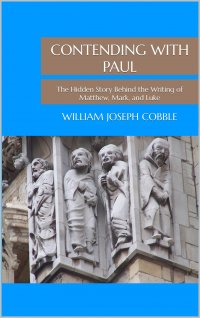Reached Amazon’s “#1 New Release in Christian History”, “#1 New Release in Biographies of Judaism”, and “#1 New Release in Christian Bible History and Culture” in its first month of publication. (May 2024)
Contending with Paul: The Hidden Story Behind the Writing of Matthew, Mark and Luke, is not a book that easily fits into existing genres. Within its pages one will find history, theology, biography, and literary criticism. This book focuses primarily on the first two generations of the Christian movement. The first generation includes the Apostles, Jesus’ family members, and Paul. It is this generation who would first debate how the message of Jesus should be presented to the Gentile world (non-Jews) and what would be expected of those Gentiles who desired to follow Jesus. It is the second generation of believers who began to write in a new literary genre that Christians call “gospels.” The Gospel of Matthew, the Gospel of Mark, and the Gospel of Luke, are the earliest three to have survived, and it is through these writings that the debates of the first generation get carried forward by the second. Though all three gospels were written after the death of Paul, it is asserted by the author that each gospel writer contended with his continuing influence in some way, though each from their own distinctive vantage point.
Paul’s influence may be underestimated if one only counts his 13 extant works in the New Testament. To ask if a mere 13 letters sent out to churches and individuals throughout the Graeco-Roman world would have been enough to influence the later gospel writers is to ask the wrong question. For the benefit of using a round number, it can be estimated that Paul ministered for 30 years. Also, for the sake of a round number, the churches and individuals to whom he corresponded may be estimated to be 20. Supposing he wrote to each of these entities twice a year, Paul’s total ministerial correspondence would rise from his 13 extant works to an output of 1,200. Paul would likely have been a dynamic figure in person as well. He is portrayed as a vigorous traveler and a debater in the marketplaces and synagogues that he came upon. Herein lies the influence. Not only is it credible that Paul’s influence would have been felt by the gospel writers, it may have been impossible for them to completely isolate themselves from it.
Paul’s base of power had been outside of Judea, in many of the larger Greek speaking cities of the Graeco-Roman world, and this is where his influence resided. It is here where Paul founded his churches, and it is here where his letters would have been received, preserved, and compiled. It is from this matrix that a Gentile believer would compose the first gospel, Mark, around 70 CE, some six years after Paul’s death. Matthew writes his gospel sometime after 80 CE, partially in rebuttal of Mark’s pro-Paul and anti-Mosaic Law themes. Several years after Matthew, Luke pens his two-volume work, the Gospel of Luke and the Acts of the Apostles (Luke/Acts). As the author details, Luke takes issue with his predecessors on several theological fronts.
The author’s goal is for you to understand the figures of this era better: Peter, the chief Apostle; James, the brother of Jesus; Paul, the new believer; and the writers that have come to be known to history as Matthew, Mark, and Luke. This book expounds on the fascinating interactions between these figures, and how these interactions shaped much of the anthology that we now call the New Testament.
Even today, Christian groups can find themselves breaking apart into ideological camps. As with the Early Church, conflicts may be argued in person, resolved by committee, or debated through literary composition. Therefore, nothing within this book should be astonishing, for they are not so different from us.





